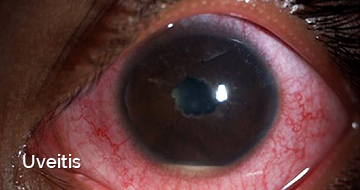
UVEITIS PATIENT INFORMATION
Uveitis is the inflammation of the inner parts of eye known as uveal tract.
Uveitis may be due to infection, autoimmune disorder (where own body defence acts against own tissue), trauma or due to unknown reasons.
Eye with uveitis may also include pain, redness, intolerance to light, floaters, dimness of vision depending upon anatomical location of uveitis.
Uveitis is generally treated with steroid eye drops. Mydriatic eye drops are given to soothe the eyes by dilating the pupil. Sometimes steroid tablets are also prescribed. In other scenario non-steroidal tablets are given to avoid side effects of steroids.
The uveal tract consists of 3 structures:
- The iris
- The ciliary body
- The choroid
The inflammation can affect different parts of the uveal tract and the disease is named after its anatomical locations.
Anterior uveitis is the inflammation in the front i.e iris and anterior cilliary body.For example iritis,irido-cyclitis.
Intermediate uveitis is the inflammation that primarily affectsthe jellylike substance known as vitreous humorthat fills the eyeball.For example vitritis, pars planitis.
Posterior uveitis is the inflammation in the back of the uveal tract and can involve the uveal tract and adjacent retina or optic nerve.For example, choroiditis, chorio-retinitis andretino-choroiditis. Panuveitis is inflammation of the entire uveal tract.
Many of the uveitis disease is limited to one eye during presentation. Gradually it may involve both the eyes. Sometimes it can present in both the eyes from the beginning.
Uveitis can rapidly damage the eye if the treatment is not given on time. It can cause long-term, vision-threatening complications, such as swelling of the macula, damage to the retina and optic nervesecondary glaucoma, and cataracts.
Uveitis is controllable with timely institution of therapy and proper follow up maintenance. Many people have only one episode of uveitis.Many have periodic recurrences over months to years or chronic inflammation requiring long-term therapy.